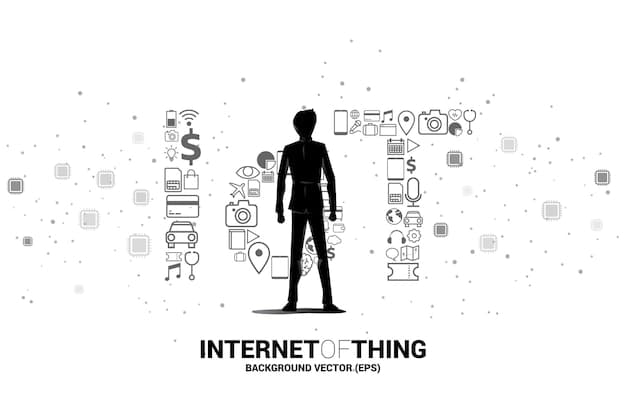Social Media & Public Opinion: Algorithms and Echo Chambers

Social media’s role in shaping public opinion is significantly influenced by algorithms and echo chambers, which can create filter bubbles and reinforce existing beliefs, impacting how individuals perceive and interact with information.
The pervasive influence of social media on our daily lives is undeniable. But how exactly do platforms like Facebook, Twitter, and Instagram shape what we believe, and how much control do we really have over the information we consume? Understanding social media’s role in shaping public opinion: the influence of algorithms and echo chambers is crucial in today’s digital landscape.
Understanding the Algorithm’s Influence
Algorithms are the backbone of social media, dictating what content we see and when we see it. These complex mathematical formulas are designed to personalize our experience, but their influence on public opinion is a double-edged sword.
How Algorithms Work
Social media algorithms analyze user data—likes, shares, comments, and browsing history—to predict what content will keep them engaged. This personalization aims to enhance user experience but can inadvertently lead to a skewed perception of reality.
The Personalization Paradox
While personalization can connect us with relevant content, it also creates filter bubbles, isolating us from diverse perspectives. This can reinforce existing biases and limit exposure to new ideas.
- Engagement Metrics: Algorithms prioritize content that generates high engagement, often amplifying sensational or controversial material.
- Data Collection: Extensive data collection allows for precise targeting, making it easier to influence opinions through tailored content.
- Filter Bubbles: Users are increasingly exposed only to information that confirms their existing beliefs, leading to polarization.

In conclusion, algorithms wield significant power in shaping our perception of the world by curating the content we consume, often leading to filter bubbles and reinforcing existing biases.
The Rise of Echo Chambers
Echo chambers amplify the effects of algorithmic filtering. These online communities reinforce shared beliefs, creating an environment where dissenting opinions are marginalized or ignored.
What Defines an Echo Chamber?
Echo chambers are characterized by a lack of diverse viewpoints, where users primarily interact with like-minded individuals. This homogeneity fosters groupthink and can lead to extreme opinions.
The Psychology of Echo Chambers
Humans naturally seek validation and acceptance. Echo chambers provide this validation, reinforcing beliefs and creating a sense of belonging. This psychological comfort can make it difficult for individuals to break free from these closed environments.
- Confirmation Bias: People tend to seek out and interpret information that confirms their existing beliefs, strengthening echo chambers.
- Social Identity Theory: Individuals identify with groups that share their values, leading to increased cohesion and resistance to outside perspectives.
- Group Polarization: Discussions within echo chambers tend to intensify existing opinions, pushing individuals to more extreme positions.
The echo chamber effect is a result of confirmation bias, social identity, and group polarization, contributing to more extreme and entrenched viewpoints.
The Impact on Political Discourse
The combination of algorithms and echo chambers poses a significant threat to political discourse. By isolating individuals within ideological silos, these forces can exacerbate polarization and undermine constructive dialogue.
Polarization and Political Divide
When people are primarily exposed to information that confirms their political beliefs, they become more entrenched in those beliefs. This polarization can lead to increased animosity and a breakdown in civil discourse.
Misinformation and Fake News
Echo chambers provide fertile ground for the spread of misinformation and fake news. Without exposure to diverse perspectives, users are less likely to critically evaluate information, making them more susceptible to manipulation.
The Role of Social Bots
Social bots can amplify the effects of echo chambers by spreading propaganda and creating the illusion of widespread support for certain viewpoints. These automated accounts can manipulate public opinion and undermine trust in legitimate sources.

Political discourse is increasingly shaped by the polarizing effects of algorithms and echo chambers, fostering misinformation and undermining trust in legitimate sources.
Strategies for Combating Echo Chambers
Addressing the negative effects of algorithms and echo chambers requires a multifaceted approach, involving individual responsibility, platform accountability, and media literacy education.
Promoting Media Literacy
Educating individuals about how algorithms and echo chambers work can empower them to make more informed choices about their media consumption. Media literacy programs can teach critical thinking skills and encourage users to seek out diverse perspectives.
Algorithmic Transparency
Advocating for greater transparency in social media algorithms can help users understand how their feeds are curated. Platforms should be more open about the factors that influence content ranking and provide users with more control over their algorithmic experience.
Encouraging Diverse Perspectives
Deliberately seeking out diverse viewpoints can break down echo chambers and promote more balanced perspectives. This can involve following people with different opinions, engaging in respectful dialogue, and reading news from a variety of sources.
- Cross-Platform Engagement: Actively participate in discussions on different platforms to encounter a wider range of perspectives.
- Fact-Checking: Verify information from multiple sources before sharing it to prevent the spread of misinformation.
- Constructive Dialogue: Engage in respectful conversations with people who hold different opinions to understand their viewpoints.
Combating echo chambers involves promoting media literacy, advocating for algorithmic transparency, and actively seeking out diverse perspectives to foster a more balanced understanding of the world.
The Future of Social Media and Public Opinion
As social media continues to evolve, it is essential to consider the long-term implications of algorithms and echo chambers on public opinion. The future will likely involve a combination of technological advancements and societal shifts aimed at mitigating these negative effects.
Decentralized Social Networks
Decentralized social networks offer an alternative to traditional platforms, providing users with more control over their data and algorithmic experience. These platforms can reduce the influence of centralized algorithms and promote greater diversity of viewpoints.
AI-Driven Content Moderation
Artificial intelligence can play a role in identifying and mitigating the spread of misinformation and harmful content. AI-driven content moderation systems can help to reduce the influence of social bots and promote more accurate information sharing.
Ethical Algorithm Design
Developing algorithms with ethical considerations in mind can help to prevent the creation of filter bubbles and promote more balanced perspectives. This involves prioritizing diversity, transparency, and user control in algorithm design.
The future of social media and its influence on public opinion hinges on developing decentralized platforms, utilizing AI for content moderation, and designing algorithms with ethical considerations.
The Role of Education and Awareness
Education and awareness are paramount in empowering individuals to navigate the complexities of the digital age. Promoting media literacy, critical thinking, and informed engagement can foster a more resilient and discerning public.
Enhancing Critical Thinking Skills
Critical thinking skills enable individuals to evaluate information effectively and resist manipulation. Educational initiatives should emphasize the importance of questioning assumptions, considering alternative perspectives, and verifying sources.
Promoting Digital Citizenship
Digital citizenship involves understanding the rights and responsibilities of online engagement. Educating individuals about ethical online behavior, respectful communication, and the importance of responsible sharing can foster a more civil digital environment.
Community Engagement Initiatives
Social media platforms need to implement responsible community engagement initiatives, fostering respectful and constructive dialogues among diverse viewpoints. These initiatives are critical for promoting tolerance, understanding, and collaborative problem-solving.
- Workshops & Seminars: Organizing workshops & seminars on media literacy, encouraging informed engagement with social media.
- Educational Partnerships: Collaborate with educational institutions to integrate digital literacy and critical thinking into curricula.
- Community Discussions: Facilitate constructive community dialogues on social media platforms to foster understanding across diverse perspectives.
Education and awareness, particularly through critical thinking, promoting digital citizenship, and community engagement, are essential in empowering individuals to navigate the digital landscape responsibly and resist manipulation.
| Key Point | Brief Description |
|---|---|
| 📢 Algorithmic Influence | Algorithms personalize content, creating filter bubbles and skewing perception. |
| 🗣️ Echo Chambers | Echo chambers reinforce shared beliefs, marginalizing dissenting opinions and fostering extreme viewpoints. |
| 🌐 Political Discourse | Polarization, misinformation, and social bots threaten political discourse and undermine trust. |
| 🌱 Media Literacy | Promoting media literacy and algorithmic transparency can empower users to make informed choices. |
Social Media’s Impact?
▼
Social media can shape public opinion by amplifying certain perspectives, reinforcing existing beliefs, and creating echo chambers.”
Role of Algorithms?
▼
Algorithms filter and personalize content based on user data, leading to filter bubbles and skewed perceptions.”
What are Echo Chambers?
▼
Echo chambers are online communities that reinforce shared beliefs, marginalizing dissenting opinions, and fostering groupthink.”
Can misinformation spread?
▼
Echo chambers exacerbate the spread of misinformation, as users within these communities are less likely to critically evaluate information that confirms their beliefs.”
What can we do?
▼
Promoting media literacy, advocating for algorithmic transparency, and seeking diverse perspectives can help break down echo chambers and foster more balanced perspectives.”
Conclusion
In conclusion, social media’s role in shaping public opinion through algorithms and echo chambers presents both challenges and opportunities. By promoting media literacy, advocating for transparency, and fostering diverse perspectives, we can mitigate the negative effects and harness the power of social media to create a more informed and engaged society.
Read more content





